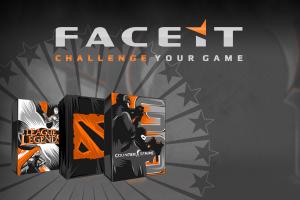One of the fastest-growing competitive online gaming platforms continues to have one helluva month to begin 2016. FaceIt has secured a $15 million Series A funding, Niccolò Maisto, founder and CEO of the London-based eSports startup, told [a]listdaily.
Fresh from enjoying a partnership with Turner Sports and WME | IMG in which they hosted qualifying rounds for the Counter-Strike: Global Offensive Championship – specifically under the bright lights of the Consumer Electronics Show – the platform announced it’s received venture-capital funding from firms Anthos Capital, Index Ventures and United Ventures.
Maisto said the company will use the money to add game titles to the platform, build out the technology and expand operations with the opening of U.S. headquarters in Santa Monica, California.
“The key to FaceIt is the community and technology we’ve developed, and to keep supporting it with additional game integrations, features and the reliability that’s expected,” Maisto said. “We have benefits to players to make it easier for them to compete, and that speaks to the user experience we offer.”
FaceIt allows gamers to play in leagues for prizes through automated tournament management and matchmaking technology. Their software development kit allows game creators to integrate tournaments into their eSports titles. They previously received a $2 million seed funding last summer.
“With an extremely strong, passionate and driven team led by Niccolò, a rapidly growing community of players and tournament organizers, robust technology and deep relationships throughout the industry, FaceIt is well-positioned to be the definitive platform across competitive gaming,” said Alex Birns of the private equity firm Anthos Capital. “The eSports market is expected to undergo massive growth over the next several years, and FaceIt has the potential to shape how developers, players and brands participate in and experience the industry.”
Ben Holmes of Index Ventures says FaceIt has been successful in building partnerships with game publishers, media companies and other industry leaders. “The company is helping developers engage more deeply with their player base by offering an easy to integrate competitive layer into their games. FaceIt is emerging as a major player in the competitive gaming ecosystem.”
Niccolò Maisto joined [a]listdaily for an exclusive interview to discuss the growing eSports industry, and a FaceIt platform that boasts hundreds of tournament organizers and over 3.5 million users.
What were the opportunities, challenges and learning experiences with partnering with Turner at CES?
Having companies like Turner and WME | IMG that come from traditional industries and enter the eSports ecosystem is great. It’s going to help the growth. It validates our concept of having a mix of eSports capability and professionalism, which is something that eSports has been lacking because it’s very community driven. With our blend of people coming from eSports and traditional industries, that’s very much in our DNA.
How will big-name corporations enable and empower eSports moving forward?
It’s something that helps a lot in order to get mainstream attention, and from brands. If you look at the industry in the last couple of years, it has grown a lot, but it came from a place where it was a cheap industry. There weren’t any financial resources to use. Today, it’s changed quite a bit. I think it’s mutually beneficial for the ecosystem as long as it’s done in a respectful way, because we have to remember that the community is the most important piece to the puzzle. It’s important for brands themselves. It’s a fast-growing target, and very hard to reach. It can not only open an additional acquisition and advertising channel, but they can also start targeting this demographic and vertical as a completely different one with its own special needs.

Why is it important to be connected to your community?
Community is the key of eSports, and what differentiates it from traditional sports – eSports is something that was born by community. It’s about taking a game beyond the session, and making it part of a lifestyle, building social connections, interactions and friendships. That’s how eSports basically grows. If you look at if from a game publisher or developer point of view, this is extremely important because it’s something that increases retention. Additionally, it’s an acquisition channel for them. ESports events are easy ways to attract large user bases.
How would do you describe the FaceIt community?
We’re very much a global company. Europe and North America are our two main regions. Europe is slightly more dominant, but North America is the fastest growing. Our demographic is ages 16-to-32, it really depends on the game. I would describe it as a hard-to-access demographic because they tend to not watch TV. They spend their time either playing games, or watching streams or digital platforms.
How is FaceIt differentiating itself from other similar tournament platforms?
The first thing is the user experience we offer, and the scale we’re at. If we compare ourselves to competitive platforms, there is no one else that ever managed and engaged the user base at scale. We have over 3.5 million people visiting FaceIt every month and that’s because we’ve managed to create what I call our ‘secret sauce’ around how to engage and how to target the players, and how to make sure they spend time in the competitions. One way is by offering brands ‘branded competitions.’ Our case studies show there is a consistent, 30 percent-plus uplift in brand awareness. If you compare it to traditional advertising, this format is less intrusive; gamers are not blinded. We’ve previously done this with Red Bull, the movie John Wick and a few European betting companies.
How can traditional brands leverage eSports to reach their target audiences?
They don’t necessarily need to change their business model, or change their products. But they should start treating it as a separate vertical. There are not many ways to reach this audience, and it’s only beginning. We’re one of them. So is Twitch. Running coordinating campaigns between eSports events, advertising on streaming platforms and branded competitions, for example, could be a good way to target the audience.
Your background is in investment banking. What drew you into eSports?
The first thing I needed to understand was that I needed to be humble enough to accept the fact that things were different. I was looking for someone that understood gaming better than myself. Co-founder Alessandro Avallone was introduced to me as a professional championship gamer. He’s been invaluable to the business since Day 1. … Getting in touch with the community is extremely important because it’s not that easy. For me, I went from dealing and advising on $1 billion deals to suddenly talking to a 16-year-old kid complaining about Internet connection.

How can investors capitalize on the eSports market?
It really depends on what you’re looking at, and what kind of investor you are. If you’re looking for technology, it’s really hard to find that in eSports. If you look at media, there are quite a few opportunities. Or the relevant teams that play themselves.
What kind of marketing and partnership opportunities does this afford for brands?
Growth is definitely one opportunity. It’s an industry that’s went from being a niche to becoming a mainstream trend. Brands need to be properly positioned in order to know how to exploit it. But it’s not easy because it’s not a structured vertical. As this is happening, whoever jumps into the pool first is going to have the best opportunities.

